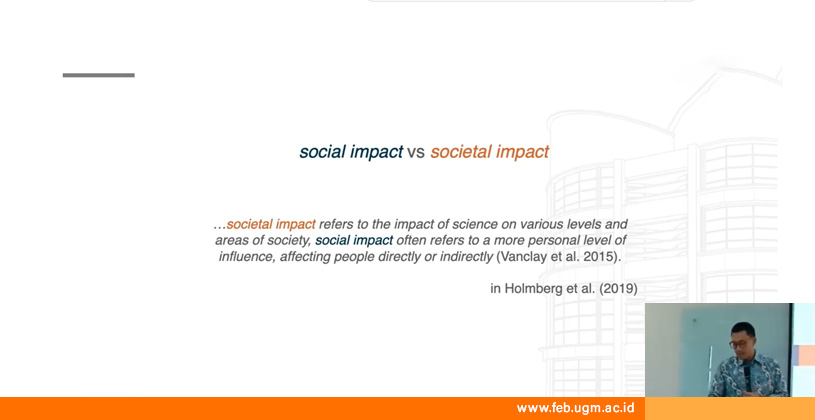Economics Laboratory of FEB UGM Held Societal Impacts Measurement Workshop
- Details
- Written by Hayfaza
- Category: News
- Hits: 571

In order to enhance the results of the various activities organized by the Laboratory and Field of Study of the Faculty of Economics and Business, Universitas Gadjah Mada (FEB UGM), the Economics Laboratory held a workshop entitled "Societal Impact Measurement Workshop" on Friday (3/2). This workshop was held at the FEB UGM Pertamina Tower Building. This workshop was moderated by Anggita Utomo, S.E. with guest speakers Gumilang Aryo Sahadewo, S.E., M.A., Ph.D., Vice Dean for Research, Community Service, Cooperation, and FEB UGM Alumni.
This workshop began with an introduction to the definitions of social impact and societal impact and the differences between the two according to Vanclay et al (2015) and Holmberg et al (2019) by Gumilang. Gumilang then explained about thought leadership and the role of social impact in the pillars of the School of Economics and Business, in addition to strategic planning, curriculum and scholarships. In essence, Gumilang emphasized that the intellectual contribution of economics and business schools can have a social impact on non-academic communities. Furthermore, Gumilang explained examples of societal impact case studies on business schools, namely GOA Institute of Management and Sasin Business School, as well as main takeaways that can be learned including: mission alignment, measurement, analyze and report, and systematic.
Gumilang then continued on to the Societal Impact Measurement session. In this session, Gumilang engaged the audience to study case studies of societal impact measurement which includes the preparation of a logical framework, preparation of indicators, data collection, to analysis and reporting of societal impact. One of its applications is measuring the societal impact of the issuance of the Indonesia Smart Card - College (KIPK) by the government. Furthermore, Gumilang explained about the causal effect and its two measurement methods. At the end of the session, Gumilang concluded the workshop with several key takeaways including: map the resources and feasibility to carry out an impact assessment of each activity, identify indicators ranging from output, intermediate outcome, to outcome, determine the most feasible impact assessment methodology for the activities being carried out, and, for certain activities, quantitative methods are difficult to apply and qualitative methods may be used. The presentation of the key takeaways marked the end of the Societal Impact Measurement Workshop by the Economics Laboratory.
Reportase: Hayfaza Nayottama


